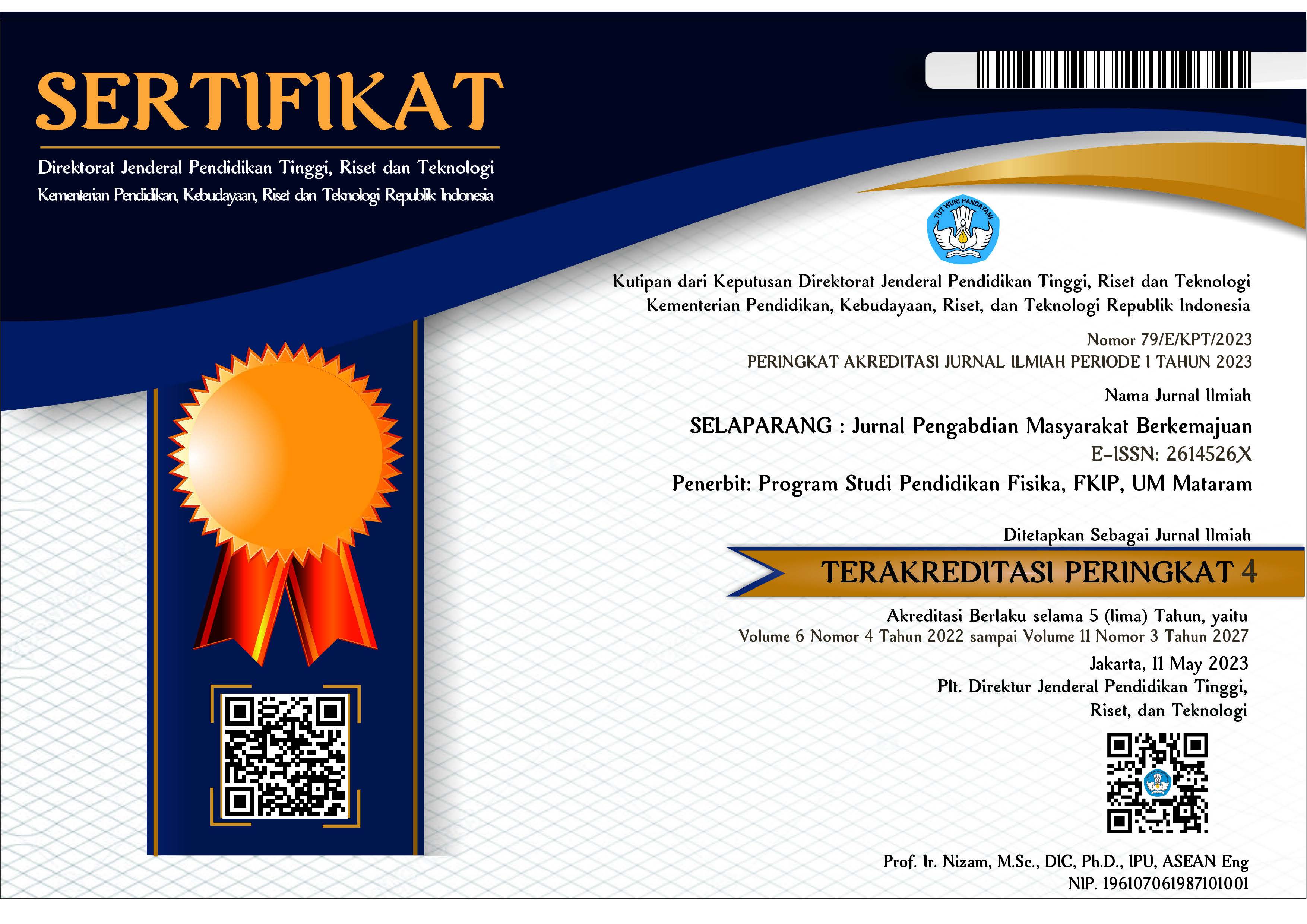Optimalisasi kemampuan menulis akademik melalui teknologi AI: kolaborasi Universiti Teknikal Malaysia Melaka dan Universitas Amikom Purwokerto
Abstract
Abstrak
Kebutuhan untuk meningkatkan kemampuan mahasiswa dalam memanfaatkan teknologi terbaru, khususnya AI, dalam proses penulisan ilmiah semakin penting di era digital. Kegiatan pendampingan penulisan artikel ilmiah menggunakan kecerdasan buatan (AI) diselenggarakan oleh Pusat Studi Media, Game, dan Mobile Universitas Amikom Purwokerto, dengan narasumber Assoc. Prof. Ahmad Naim Che Pee dari Human-Centered Computing and Information Systems Lab (HCC-ISL), UteM dilaksanakan pada tanggal 1 Agustus 2024. Tujuan dari kegiatan ini untuk memberikan pemahaman serta keterampilan praktis bagi mahasiswa dalam penggunaan AI, khususnya Chat GPT, dalam menyusun artikel ilmiah, mulai dari penyusunan struktur, pengecekan tata bahasa, hingga pengelolaan referensi. Metode pelaksanaan kegiatan meliputi pre-test untuk mengukur pemahaman awal mahasiswa, pelatihan yang mencakup teori dan praktik penggunaan AI, post-test untuk menilai peningkatan pemahaman, serta sesi tanya jawab dan evaluasi. Hasil evaluasi menunjukkan peningkatan signifikan dalam pemahaman mahasiswa, yang tercermin dari data hasil post-test yang lebih baik dibandingkan pre-test. Selain itu, mahasiswa menyatakan bahwa pelatihan ini memberikan wawasan baru yang relevan untuk mendukung tugas akademik mereka.
Kata kunci: pendampingan; kecerdasan buatan; chat GPT; mahasiswa; penulisan artikel.
Abstract
Enhancing students' abilities to utilize the latest technology, particularly AI, in scientific writing is becoming increasingly important in the digital era. A scientific article writing mentorship program using Artificial Intelligence (AI) was organized by the Media, Game, and Mobile Research Center at Universitas Amikom Purwokerto, with the guest speaker Assoc. Prof. Ahmad Naim Che Pee from the Human-Centered Computing and Information Systems Lab (HCC-ISL), UTeM, held on August 1, 2024. This activity aimed to provide students with practical understanding and skills in using AI, specifically Chat GPT, in composing scientific articles, from structuring the paper and grammar checking to managing references. The implementation method included a pre-test to measure students' initial understanding, training sessions covering theory and practical use of AI, a post-test to assess improvements, and a Q&A session and evaluation. The evaluation results showed a significant improvement in students' understanding, as reflected in the post-test data, which were better than the pre-test results. Students reported that this training provided new and relevant insights to support their academic tasks.
Keywords: mentoring; artificial intelligence; chat GPT; students; article writing.
Keywords
Full Text:
PDFReferences
Alharbi, W. (2023). AI in the Foreign Language Classroom: A Pedagogical Overview of Automated Writing Assistance Tools. Education Research International, 2023, 1–15. https://doi.org/10.1155/2023/4253331
Buriak, J. M., Hersam, M. C., & Kamat, P. V. (2024). Can ChatGPT and Other AI Bots Serve as Peer Reviewers? ACS Energy Letters, 9(1), 191–192. https://doi.org/10.1021/acsenergylett.3c02586
Carobene, A., Padoan, A., Cabitza, F., Banfi, G., & Plebani, M. (2024). Rising adoption of artificial intelligence in scientific publishing: evaluating the role, risks, and ethical implications in paper drafting and review process. Clinical Chemistry and Laboratory Medicine (CCLM), 62(5), 835–843. https://doi.org/10.1515/cclm-2023-1136
Dwivedi, Y. K., Hughes, L., Ismagilova, E., Aarts, G., Coombs, C., Crick, T., Duan, Y., Dwivedi, R., Edwards, J., Eirug, A., Galanos, V., Ilavarasan, P. V., Janssen, M., Jones, P., Kar, A. K., Kizgin, H., Kronemann, B., Lal, B., Lucini, B., … Williams, M. D. (2021). Artificial Intelligence (AI): Multidisciplinary perspectives on emerging challenges, opportunities, and agenda for research, practice and policy. International Journal of Information Management, 57, 101994. https://doi.org/10.1016/j.ijinfomgt.2019.08.002
Gasparyan, A. Y., Nurmashev, B., Seksenbayev, B., Trukhachev, V. I., Kostyukova, E. I., & Kitas, G. D. (2017). Plagiarism in the Context of Education and Evolving Detection Strategies. Journal of Korean Medical Science, 32(8), 1220. https://doi.org/10.3346/jkms.2017.32.8.1220
Grimaldi, G., & Ehrler, B. (2023). AI et al. : Machines Are About to Change Scientific Publishing Forever. ACS Energy Letters, 8(1), 878–880. https://doi.org/10.1021/acsenergylett.2c02828
Hind, B., Jallal, M., Serhier, Z., & Bennani Othmani, M. (2024). Exploring the Horizon: The Impact of AI Tools on Scientific Research. Data and Metadata, 3, 289. https://doi.org/10.56294/dm2024289
Hryciw, B. N., Seely, A. J. E., & Kyeremanteng, K. (2023). Guiding principles and proposed classification system for the responsible adoption of artificial intelligence in scientific writing in medicine. Frontiers in Artificial Intelligence, 6. https://doi.org/10.3389/frai.2023.1283353
Kammer, M. N. (2023). The Role of Artificial Intelligence in Scientific Writing. Journal of Clinical Case Reports Medical Images and Health Sciences, 3(3). https://doi.org/10.55920/JCRMHS.2023.03.001116
Kedra, J., Radstake, T., Pandit, A., Baraliakos, X., Berenbaum, F., Finckh, A., Fautrel, B., Stamm, T. A., Gomez-Cabrero, D., Pristipino, C., Choquet, R., Servy, H., Stones, S., Burmester, G., & Gossec, L. (2019). Current status of use of big data and artificial intelligence in RMDs: a systematic literature review informing EULAR recommendations. RMD Open, 5(2), e001004. https://doi.org/10.1136/rmdopen-2019-001004
Khabib, S. (2022). Introducing artificial intelligence (AI)--based digital writing assistants for teachers in writing scientific articles. Teaching English as a Foreign Language Journal, 1(2), 114–124. https://doi.org/10.12928/tefl.v1i2.249
Kouam Arthur William, F. (2024). AI in Academic Writing: Ally or Foe? International Journal of Research Publications, 148(1). https://doi.org/10.47119/IJRP1001481520246427
Nafea, A. A., AL-Ani, M. M., Khalaf, M. A., & Alsumaidaie, M. S. I. (2024). A Review of Using Chatgpt for Scientific Manuscript Writing. Babylonian Journal of Artificial Intelligence, 2024, 9–13. https://doi.org/10.58496/BJAI/2024/002
Nazari, N., Shabbir, M. S., & Setiawan, R. (2021). Application of Artificial Intelligence powered Digital Writing Assistant in higher education: randomized controlled trial. Heliyon, 7(5), e07014. https://doi.org/10.1016/j.heliyon.2021.e07014
Schmidt, P. G., & Meir, A. J. (2024). Using Generative AI for Literature Searches and Scholarly Writing: Is the Integrity of the Scientific Discourse in Jeopardy? Notices of the American Mathematical Society, 71(01), 1. https://doi.org/10.1090/noti2838
Zawacki-Richter, O., Marín, V. I., Bond, M., & Gouverneur, F. (2019). Systematic review of research on artificial intelligence applications in higher education – where are the educators? International Journal of Educational Technology in Higher Education, 16(1), 39. https://doi.org/10.1186/s41239-019-0171-0
DOI: https://doi.org/10.31764/jpmb.v8i4.26335
Refbacks
- There are currently no refbacks.

This work is licensed under a Creative Commons Attribution-ShareAlike 4.0 International License.
______________________________________________________
Jurnal Selaparang
p-ISSN 2614-5251 || e-ISSN 2614-526X
EDITORIAL OFFICE:



















